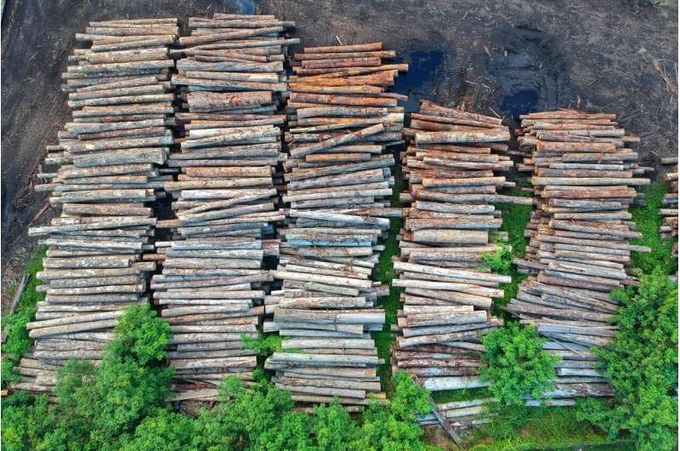June 14, 2025 | 23:11 GMT +7
June 14, 2025 | 23:11 GMT +7
Hotline: 0913.378.918
June 14, 2025 | 23:11 GMT +7
Hotline: 0913.378.918

Photo: Pok Rie from Pexels
It's a mind-boggling statistic, especially since it represents 21% more forest cover than should have been lost that year to keep pace to end deforestation by 2030—a pledge from the 2021 United Nations climate conference (COP26 ) in Glasgow, Scotland. At last year's COP28 in Dubai, world leaders renewed their pledge to reverse deforestation.
Yet forests are still being cleared at a dizzying pace. In 2022, the world lost more than 11 soccer fields of tropical forest per minute.
Environmental crises are for many people an abstraction, and so can seem their repercussions. But I am a physician in infectious diseases, and my first instinct when looking at a forest is to see it through the lens of a microbe. Microbes can bring diseases to humans, and for that reason the World Health Organization has applied a philosophy to them called One Health. Simply, it's a belief that the fitness of humans, animals and the environment are one and the same—inextricably linked.
Trees play a seminal role. Removing a forest can push forest-dwelling animals into human environs, sometimes bringing with them a pathogen. That chain of events has been tied to Ebola flare-ups in Central and West Africa and the upswing of Lyme disease in the northeastern United States.
It harms animals too. In subtropical parts of Australia where forests are blithely cleared, bats experience profound stress from human-induced land change. Access to the diet of their native habitats is taken away, and in a nutritionally deprived state, they are known to shed greater amounts of the Hendra virus— which can pass on to horses and then humans, with high fatality rates.
After the loss of a forest, it's not just what is added to our lives that can pose a problem. It's also what's taken away. Forests have traditionally functioned as "carbon sinks." The Earth's trees absorb more than 7 billion metric tons of carbon dioxide—about a fifth of what the world lets out into its atmosphere— and release it back as oxygen or bind it into sugars that form their roots, branches and leaves.
Felling a forest unlocks this carbon vault. Some parts of the Amazon are so razed that they've become carbon sources— leeching more carbon than they soak up. About 12% of the global greenhouse gas emissions that warm the planet are estimated to derive from deforestation.
Then there's evidence showing the extent to which forests influence our mental health. Poorer air quality, a byproduct of deforestation, is linked to higher rates of depression and anxiety. By contrast, research has found that the more a country's landmass is covered by forests, the lower its prevalence of mental health disorders.
In the 1980s, Japan even pioneered a form of therapy around trees: s hinrin-yoku, also known as "forest bathing," which seeks to harness psychologically restorative effects from being outdoors. The practice has become fairly popular in California, and here in Canada some doctors prescribe it.
So what can be done? Saving the world's forests requires understanding the cultural and economic motivations that clear them in the first place.
Some solutions have to be localized to the millions of people who are still sustained by forests. In Borneo, for instance, some Indigenous communities with few economic options turn to illegal logging to make ends meet. But researchers found that subsidizing a local clinic to make health care more affordable and accessible reduced this problem.
In some logging-dependent communities, forest charities such as Alam Sehat Lestari buy people's chainsaws in return for a zero-interest loan and support in shifting to more environmentally sustainable businesses, like beekeeping or fishing.
Ultimately, however, three-quarters of global deforestation is driven by agriculture—a reality that calls for ambitious legislation. The European Union's regulation on deforestation-free supply chains imposes trade embargoes on products such as palm oil, cattle and soy that are frequently produced on illegally deforested lands, and in the U.S., the FOREST Act is a bipartisan bill that would take a similar approach. Brazil has already shown some promise in slowing the deforestation trend.
It's easy enough for leaders to make pledges. What remains to be seen is if they'll be able to see the forest from the trees and produce real change rather than an empty promise.
(Phys.org)

(VAN) Extensive licensing requirements raise concerns about intellectual property theft.

(VAN) As of Friday, a salmonella outbreak linked to a California egg producer had sickened at least 79 people. Of the infected people, 21 hospitalizations were reported, U.S. health officials said.

(VAN) With the war ongoing, many Ukrainian farmers and rural farming families face limited access to their land due to mines and lack the financial resources to purchase needed agricultural inputs.

(VAN) Vikas Rambal has quietly built a $5 billion business empire in manufacturing, property and solar, and catapulted onto the Rich List.

(VAN) Available cropland now at less than five percent, according to latest geospatial assessment from FAO and UNOSAT.

(VAN) Alt Carbon has raised $12 million in a seed round as it plans to scale its carbon dioxide removal work in the South Asian nation.

(VAN) Attempts to bring down the price of the Japanese staple have had little effect amid a cost-of-living crisis.